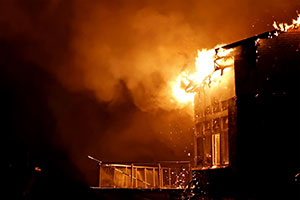A senior deputy state fire marshal has testified in the trial of Robert Schech Sr. Evidence showed that the fire was intentionally set.
Donna Schech’s Death
Robert Schech Sr. is on trial for first-degree murder, first-degree arson, felony murder and malicious burning in connection with the death of his wife, Donna Schech. Donna Schech died on November 13, 2016 of heat and smoke-related injuries in a fire. Robert Schech is accused of setting the fires that caused Donna’s death.
Robert Schech’s Trial
The state called Senior Deputy State Fire Marshal Michael Selvage to testify as an expert in fire investigation and to determine the origin and cause of the fire. Selvage testified that fire investigations involve systematic approaches and the use of the scientific method. He said, “We don’t just run in and start doing things. It’s very specific.”
Selvage showed the court images from the scene of the fire taken by investigators and by drone video. Selvage showed that the right side of the home was almost completely consumed by the fire; the left side of the home, near the master bedroom where Donna Schech’s body was found, was more intact. Selvage pointed out that objects on the floor of the bedroom were consumed by fire and the patterns around the ceiling and walls were consistent with a fire progressing into a room. Selvage testified that the official Fire Marshal’s report listed the two origins of the fire as the dining room of the first floor and the bottom landing and steps of the basement. Selvage said that the fire’s cause was listed as incendiary, which meant that it had been deliberately set.
Defense attorney Joseph Murtha cross-examined Selvage. Murtha asked Selvage if Schech’s statements to investigators were taken into consideration when determining the origin and cause of the fire. Murtha asked what the standard was for believing Schech’s statements.
Under questioning, Selvage said that investigators returned to the scene of the fire more than one year later to gather additional data and perform due diligence. During this visit, control samples of the carpet in the living room were collected from under an entertainment system. The sample was used to compare to the carpet that was between the living room and dining room that was confirmed to contain gasoline. Tests on the control sample showed that the sample did not contain petroleum. Investigators also found a gas can under debris by the front of the carport that they believed was present on the night of the fire.
Murtha questioned how investigators could be sure that degradation and spoliation had not occurred in the 15 months since the fire. Murtha asked if there was any way to know how much accelerant was present in the areas it was located. Selvage responded that there was no way to determine the amount of accelerant.
Murtha asked Selvage whether the gasoline or gas cans could have been moved to different locations by firefighters. Selvage said that it was unlikely that this could have happened. Selvage said that the helmet camera footage showed that the gas cans would have been under at least a foot of debris before any firefighting began.
A defense expert, Craig Beyler, challenged the investigator’s findings and concluded that the fire was accidental.
Verdict
The case was tried to a judge, not a jury. Judge Thomas Stansfield concluded that a reasonable doubt existed as to guilt, and found Schech not guilty of all charges. Schech was released from custody after spending 539 days in jail.




